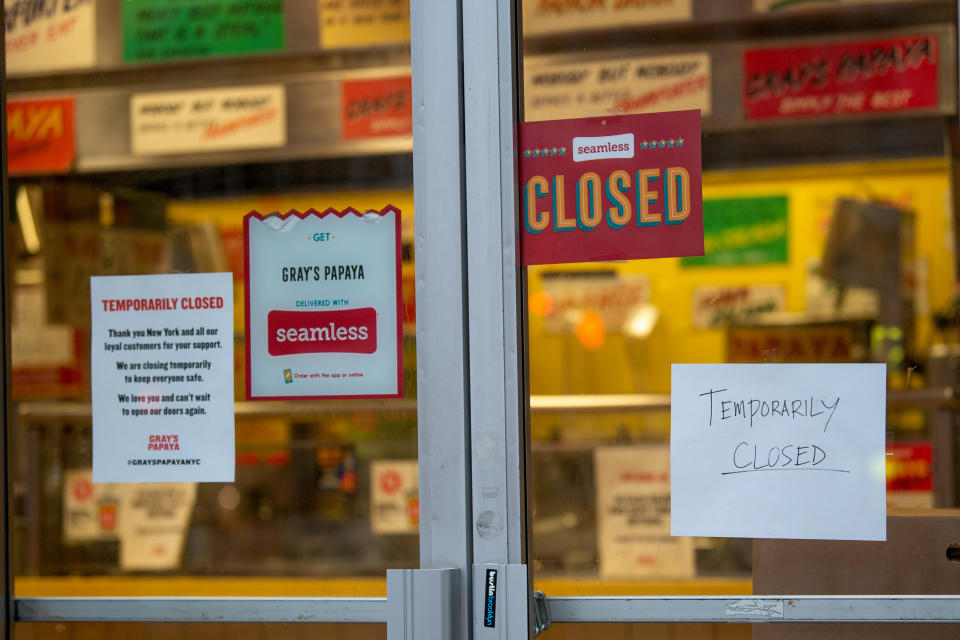Restaurant CEO on COVID-19: 'I honestly don't see a scenario where 50% to 60% of restaurants don't close'
The restaurant business is a tough one to succeed at during the best of times. Throw in the economic uncertainty and upheaval created by the coronavirus pandemic, and the odds of success become even grimmer.
“I honestly don't see a scenario where 50% to 60% of restaurants don't close through this,” Alex Smith, Atlas Restaurant Group CEO, told Yahoo Finance this week.
In an interview with On The Move, Smith laid out the monumental challenges facing restaurants looking to resume business after being closed down. “The margins are thin. Food cost is going up because there's a run on pork and beef and chicken. And there's issues in the plants, so they're closing plants down. So what does the new normal look like?” he said.
Not good, according to Smith.

Atlas Restaurant Group, based in Baltimore, Maryland, is made up of 15 restaurants — 14 of them currently closed. With restaurant margins notoriously tight, the question becomes how to maintain profitability as discussions center on social distancing and mandating space between tables as a requirement for reopening. Lower occupancy means a big hit to revenue.
[See also: ‘It’s going to take at least a year to get out of this hole’: PA pub owner on COVID-19]
“I think that at a 50% occupancy rate, we break even, maybe lose a little money. At 25%, it's certainly not sustainable. And our goal — basically survival. How do we hold on for the next three months, four months until this thing passes and the majority of the general public feel safe to come out again?” posed Smith.
‘What happens if there’s a second wave?’
And gaining public trust and confidence in eating out again doesn’t mean the end of worries for the food industry, according to Smith.
“What does August and September look like if this thing starts to flare up again? That's what's more concerning to me. I think that anybody who has been approved for PPP or has gotten an SBA Express loan, I think that for the next six eight weeks, I think we're OK to make it through that,” Smith said, referring to forgivable loans under the Paycheck Protection Program and loans given to businesses under the U.S. Small Business Administration.
“The more concerning thing for us and the people I talk to in the industry is what happens if there's a second wave?” he added.
The government has given $659 billion in forgivable loans to small businesses, but many are still on the precipice of failure. Smith said he plans to incorporate rigid safety measures including adding new sanitation stations at the front door, restrooms, and kitchen. He’ll also conduct employee wellness checks and incorporate disposable menus.
“All we can do is open up our doors and hope for the best and go above and beyond as far as safety precautions and procedures and hopefully make people feel that they're comfortable to come in and have a great experience,” he said.
For now, he’s focused on getting his 1,000 furloughed employees back to work.
Yvette Killian is a producer for Yahoo Finance’s On The Move.
READ MORE:
Senator Sherrod Brown calls Trump's coronavirus response 'incompetent' and 'immoral'
'Everything just changed so drastically': Veteran trucker describes 'chaos' after coronavirus
Hotels are hurting ‘big-time’ and many will ‘go under,’ travel expert says
America's bailed-out airlines are not 'playing fair' with customers, travel expert says
The coronavirus cruise ship problem: 'Every lost voyage' could cost $4 million in revenue
Read the latest financial and business news from Yahoo Finance
Follow Yahoo Finance on Twitter, Facebook, Instagram, Flipboard, SmartNews, LinkedIn, YouTube, and reddit.